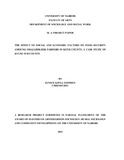| dc.contributor.author | Stephen, Eunice K | |
| dc.date.accessioned | 2016-04-22T10:01:37Z | |
| dc.date.available | 2016-04-22T10:01:37Z | |
| dc.date.issued | 2015 | |
| dc.identifier.uri | http://hdl.handle.net/11295/94881 | |
| dc.description.abstract | This study examines the effects of socio and economic factors on food security situation in
Kitui County with Kyuso Sub-County as a case study. Kyuso Sub-county is semi-arid and is
a typical dry land area. Frequent food shortage, drought and famine remain major problems
in the area.
The specific objectives of the study were to; a) To determine the extent to which household
size affects household food security; b) To establish the extent to which cultural beliefs and
practicesaffect household food security; c) To determine the extent to which household
income and expenditure affect household food security and d) To identify coping strategies
to household food insecurityamong smallholder farmers in Kyuso Sub-County. Fieldwork
was carried out between February and April 2015 where structured questionnaires were used
to collect informationfrom 398 household heads. Additional information was collected from
key informants. They were: 2 Government Officials, 2 NGO representative and 2
administration officials. The obtained data were processed using the Statistical Package for
Social Sciences (SPSS) computer programme. The programme was used to run frequencies
and percentages on key variables investigated in the study. Tables and graphs have been used
widely in the presentation of the data. Patterns and trends emerging from the data were
interpreted qualitatively. Findings were also cross checked against a conceptual model of
factors affecting food security in dry land environments developed by the researcher earlier
on in the research.
The study revealed that Kyuso Sub-County is food insecure area with high frequency of
famines and struggle for food accessibility for most of the households. The findings revealed
that human factors have a great influence on food security situation in the arid and semi-arid
lands. These include prevailing marketing systems which greatly influence food pricing in
the area. Inadequacy of social services and physical infrastructure has contributed to low
development consequently affecting food security. Due to less exposure and low formal
education attainment there is more inclination to traditions and cultural believes among the
inhabitants. This has hindered development especially in the agricultural sector. The study
has also revealed that some coping strategies adopted by the inhabitants and poor have also
contributed to environmental degradation resulting to low food productivity and food
insecurity. Hence, conclusion that socio and economic factors investigated in the research
have considerable effects on the prevailing food security situation in Kyuso Sub-County of
Kitui County. This finding can be extrapolated to some extent to other dry land areas of
Kenya. Tackling food shortages and insufficiency in Kenya's dry lands therefore require
addressing not only natural factors such as rainfall but also focusing on human factors. | en_US |
| dc.language.iso | en | en_US |
| dc.publisher | University of Nairobi | en_US |
| dc.subject | economic factors, security, smallholder farmers, Kitui | en_US |
| dc.title | The Effect of Social and Economic Factors on Food Security Amoung Smallholder Farmers in Kitui County: a Case Study of Kyuso Sub-county | en_US |
| dc.type | Thesis | en_US |

